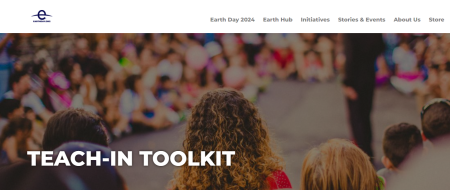ACTIONS
- Protect and safeguard cultural and natural heritage
- Learning and educational opportunities
- Cultural participation/social inclusion
- Sustainable tourism
- Support research
- Employment (recruiting, training, safety)
- Energy consumption, greenhouse gas emissions
- Waste management and reduction
- Transport (forms of, energy use)
- Commercial activities including copyright and IP
- Governance and management
- Security, disaster preparedness, risk reduction
- External partnerships and collaborations
- Toolkit/framework/roadmap
- Sign-post to other resource (database)
- Campaign
Earthday.org Teach-in Toolkit
- Earthday.org
“Teach-ins play a significant role in providing communities with the knowledge they need to advocate for a cleaner, more secure future. Use this toolkit to plan an effective teach-in that will bring your community together and build capacity to make change!...
The goals for Teach-Ins are:
- Inform communities about local environmental issues and how climate change will impact their region, the country and the world.
- Promote values and behaviors that address environmental degradation and climate change in an inclusive and participatory setting.
- Empower your community with the civic engagement skills necessary to take action to help fight climate change.”
Avaiable in
- English
SDGs LINKAGES
The educational resources support SDG targets 4.7 (Education for Sustainable Development), 12.8 (education for sustainable lifestyles), 13.1 (climate adaptation), 13.3 (climate education and institutional capacity) and 13.B (climate action for Global South countries), which can in turn support a wide range of further targets in many SDGs.
The advocacy resources also support SDGs 10.2 (universal inclusion) and 16.7 (inclusive decision making), and 17.16 and 17.17 (international and cross-sector partnerships).
Click on the SDG Target to discover Our Collections Matter indicators
-
Our Collections Matter indicators:
- Numbers of people in each type of programme drawing on collections from different demographic groups.
- Increases in numbers of people in each type of programme from different demographic groups.
- Proportion of people involved in such programmes in relation to overall audience size.
- Evidence that learners have acquired knowledge and skills to promote sustainable development.
-
Our Collections Matter indicators:
- Collections development to ensure that collections effectively meet the needs of all, irrespective of age, sex, disability, race, ethnicity, origin, religion or economic or other status.
- Number and proportion of educational and participatory programmes that promote participation irrespective of social or other status.
- Numbers and proportions of people making use of collections in relation to the demographic of the local population.
- Numbers and proportions of people involved in focused programmes aimed at promoting social, economic and political inclusion.
- Numbers and proportions of people from different demographic groups involved in decision-making processes relating to collections and collections-based institutions.
- Number and types of partnerships that build relationships with marginalized groups, individuals and communities.
-
Our Collections Matter indicators:
- Extent to which (i) global citizenship education and (ii) education for sustainable development (including climate change education) are mainstreamed in (a) national education policies; (b) curricula; (c) teacher education; and (d) student assessment.
- Extent to which global citizenship education and education for sustainable development (including climate change education) are mainstreamed in formal, informal and non-formal education programmes and activities drawing on and related to collections.
-
Our Collections Matter indicators:
- Plans in place for near and longer term to withstand and actively adapt to climate-related hazards and natural disasters.
-
Our Collections Matter indicators:
- Plans in place to enhance positive contributions to addressing climate change through use of collections. Plans in place to ensure collections, collections institutions and broader society can adapt effectively to climate change.
- Plans in place for effective education and awareness raising on climate change mitigation, adaptation, impact reduction and early warning.
- Plans in place to reduce negative contributions of collections-related functions, e.g. measuring greenhouse emissions with plans and targets in place to reduce them.
-
Our Collections Matter indicators:
- Number of initiatives (educational, awareness-raising, research, and/or partnerships) drawing on collections and collections-based institutions that build capacity for climate change planning and management in least developed countries and small island developing States.
- Number of targeted initiatives drawing on collections and collections-based institutions aimed at building capacity for women, youth and local and marginalized communities in least developed countries and small island developing States.
-
Our Collections Matter indicators:
- Proportions of positions (by sex, age, persons with disabilities and population groups) in public institutions (national and local legislatures, public service, and judiciary) compared to national distributions.
- Proportion of population [audience/users/non-users] who believe decision-making is inclusive and responsive, by sex, age, disability and population group.
- Decision-making addresses societal, environmental and economic challenges related to the community, considering short-term and long-term risks and opportunities.
- Decision-making draws on diverse backgrounds, viewpoints and interests, reflecting a broad base of stakeholders, and working to promote inclusion and provide effective services for all of society.
-
Our Collections Matter indicators:
- Number and/or increase in number, and diversity of global and international multi-stakeholder partnerships that share collection-related knowledge, expertise, technology and financial resources to address the SDGs, or that otherwise involve collections-based organisations and institutions.
- Number and/or increase in number, and diversity of global and international multi-stakeholder partnerships involving developing countries that share collection-related knowledge, expertise, technology and financial resources to address the SDGs.
-
Our Collections Matter indicators:
- Amount of United States dollars committed to public-private and civil society partnerships.
- Number and/or increase in number, and diversity of local, national and regional multi-stakeholder (public, public-private and civil society) partnerships that address the SDGs drawing on collections, or that otherwise involve collections-based organisations and institutions.

